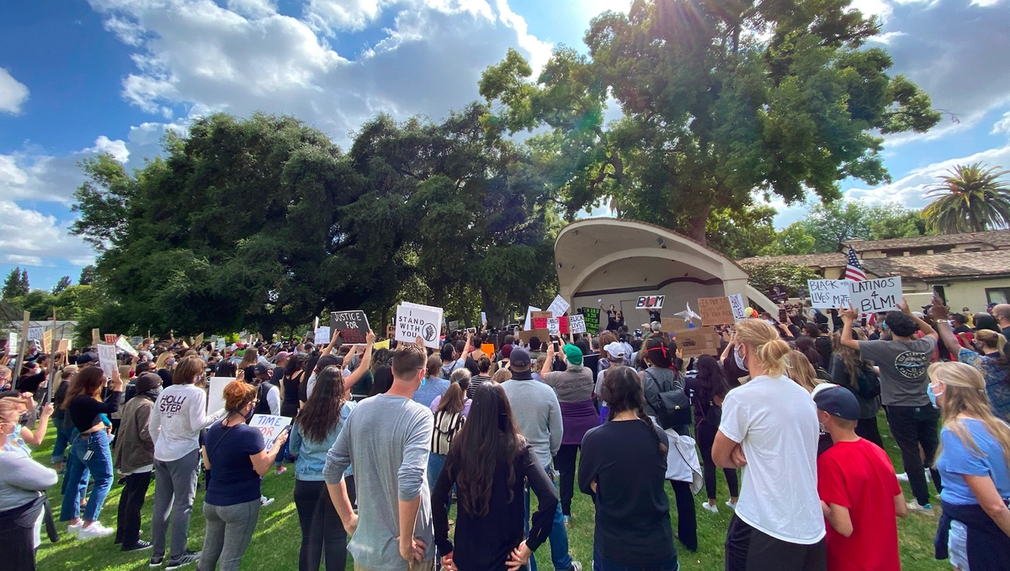Creating Safety by Building Power
Our vision starts with an anti-racist Claremont. Our goal is to make our community safer for Black and Latino residents by reducing unnecessary police interactions. We aim to achieve this by decreasing the policing budget and reinvesting in Human Services that can provide wraparound mental health, housing, and social services. We are accomplishing this by building power in our community by providing educational workshops, reconstructing city budgets, and driving diverse representation within city leadership.

What is the primary issue area that your application will impact?
Community Safety
In which areas of Los Angeles will you be directly working?
County of Los Angeles
Other:: Claremont
In what stage of innovation is this project, program, or initiative?
Expand existing project, program, or initiative
What is your understanding of the issue that you are seeking to address?
Our police department (CPD) disproportionately interacts with and harasses Black and Latino residents. Data shows that 18% of those stopped by CPD are Black, yet they make up only 5% of the Claremont population. Data on the school resource officer indicates that Black and Latino students account for twice as many citations and arrests as their white counterparts. Testimonies and public comments from people of color in Claremont speak to the repeated harassment and lack of comfort and safety. National and local data make it clear that increased interactions between police and people of color lead to overcriminalization and punitive measures at over twice the rate of white people. While concerning, these data points are unsurprising given that Claremont’s budget allocates 54% of its general fund to the police department while Human Services receives only 7%. This means that Claremont is prioritizing a department that reduces the quality of life and safety of people of color.
Describe the project, program, or initiative this grant will support to address the issue.
Our goal is to reduce the frequency of interactions between police and Black and Latino people in Claremont by focusing on calls for service and the city budget. Our initiative has four stages. The first stage is to lobby the police commission to review calls for service in order to determine the percentage of calls for service that should not require an armed officer. Subsequently, we will be initiating a workshop series detailing anti-racism, how to engage city leadership, and how to build a budget that prioritizes the safety of Black and Latino residents. Then we will mobilize our community and build power to advocate for the redirection of funding from the police department to the Human Services department at City Council and commission meetings. This will focus on developing a robust Human Services department that can provide wraparound social services that are currently lacking in Claremont. The fourth stage is to improve representation within city leadership by resources and support for Black and Latino residents interested in running for open seats. The four stages of our initiative aim to recenter Black and Latino residents by building power through data, education, engagement, and representation in local government. This will result in decreased interactions with police and increased critical social services that improve physical and psychological safety.
Describe how Los Angeles County will be different if your work is successful.
Nearly 60% of LA County residents live in small cities. That means that most policies and decisions in our county are happening in small towns like Claremont. We believe it is critical to develop a scalable initiative to build power in BIPOC communities. Our vision of success is as follows: CPD’s budget is reduced by 25% ($3.25 million) and reinvested in the Human Services department. The Human Services department has the capacity to provide wraparound mental health, housing, and social services to the Claremont community. The Human Services department can respond to nonviolent calls for services. That 35% of city leadership is comprised of people of color, equalling their demographic representation in Claremont. Success means that constituents know how to impact policy decisions and how to advocate on their own behalf. Success means that anti-racism is prioritized by city leadership, not only in sentiment but in writing.
What evidence do you have that this project, program, or initiative is or will be successful, and how will you define and measure success?
Our impact will be measured by 1) observing a lower disproportionality of arrests and profiling among Black residents using Racial and Identity Profiling Act (RIPA) Stop Data, 2) reducing the number of calls for service directed and responded to by armed officers, 3) reducing the police budget while increasing the human services budget, and 4) increasing the proportion of non-white members in local leadership. To date, dialogue in our community has significantly changed due to our sustained efforts. We advocated for a more diverse and inclusive Police Commission, which resulted in its expansion from 7 to 9 residents. We have assisted two progressives in campaigning for city council seats. We have asked the police commission to complete an audit of calls for service. We led the effort and successfully advocated for improved community input when determining annual city priorities and budgets.
Approximately how many people will be impacted by this project, program, or initiative?
Direct Impact: 15,000
Indirect Impact: 37,000